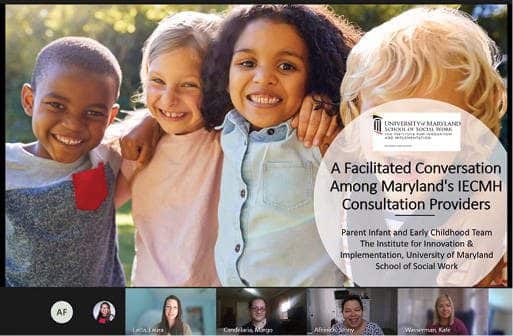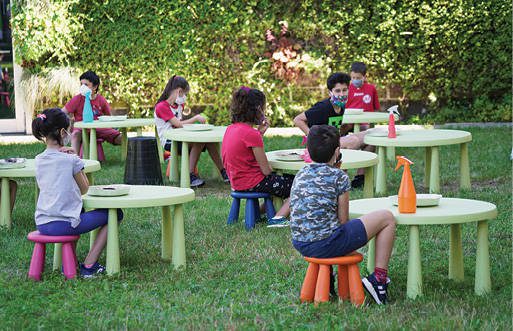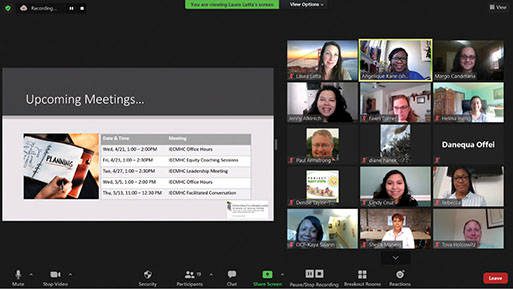Jenny Afkinich, Jenny Torres, Laura Latta, Kate Sweeney Wasserman, Katherine Endy, and Margo Candelaria, Institute for Innovation and Implementation University of Maryland, Baltimore

Abstract
Maryland’s Infant and Early Childhood Mental Health Consultation (IECMHC) program has pivoted to respond to the complex and changing needs of early childhood education providers and the families they serve during the COVID-19 pandemic. Consultants have innovatively adapted and increased outreach, support services, classroom and child observation, and consultation. The Parent, Infant, & Early Childhood team at the University of Maryland, Baltimore, School of Social Work’s Institute for Innovation and Implementation conducted focus groups with consultants, IECMHC program directors, and state partners. This article presents three primary themes resulting from the focus groups: working remotely, focusing on equity, and the importance of IECMHC services.
We need to make sure we’re … responding to teachers’ and families’ and children’s needs. But also at the same time, focusing on prevention. That’s where we’re focused in infant early childhood mental health. We’re working with the families as soon as we can. —State partner
Consultation Services
The Infant and Early Childhood Mental Health Consultation (IECMHC) program is an evidence-informed intervention for supporting children’s social and emotional development and for addressing challenging behaviors in early learning and home environments (Cohen & Kaufmann, 2000). IECMHC providers aim to improve the ability of staff, families, programs, and systems to prevent, identify, treat, and reduce the effects of mental health problems among children from birth to 6 years old and their families. IECMHC has been shown to improve classroom climate and child behaviors while reducing preschool suspensions and expulsions (Perry et al., 2010).
Consultants from the IECHMC program provide a broad range of supports with the goal of increasing the capacity of early childhood education (ECE) providers to understand the meaning behind children’s behaviors and to provide strategies to support development (Cohen & Kaufmann, 2000). IECMHC providers adopt a consultative stance—collaborating with ECE providers rather than assuming the role of an expert (Johnston & Brinamen, 2006)—and they help providers to understand the influence of adult behaviors and the effects of trauma on children. IECMHC providers screen ECE programs for needs, assist programs in identifying and using evidence-based practices, and refer families to external services when appropriate (Substance Abuse and Mental Health Services Administration [SAMHSA], 2014).
Maryland Model and History
The Maryland State Department of Education (MSDE), Division of Early Childhood (DEC), and Division of Early Intervention and Special Education Services have been committed to IECMHC work since 2002, through the initiation of a pilot project that spanned three jurisdictions in the state. MSDE now operates 11 programs that cover all 24 of Maryland’s jurisdictions. Through an ongoing partnership with the Parent, Infant, & Early Childhood (PIEC) team from the University of Maryland, Baltimore, School of Social Work (UMB SSW) Institute for Innovation and Implementation, the IECMHC program, funded by MSDE, has grown to include a statewide data management system and regular production of reports and legislative briefs, as well as ongoing training and professional development.
In 2016, Maryland was selected as one of 14 pilot sites nationwide to receive expert technical assistance through the SAMHSA-funded Center of Excellence (CoE) for IECMHC (MSDE et al., 2020). This work resulted in the development of new state standards for IECMHC implementation. The new standards, published and disseminated in the summer of 2020, use a tiered approach to consultation for the state’s workforce. This approach was an effort to align the current consultation workforce in the state with the national model while acknowledging the need to build up a pool of qualified applicants for the higher standards of licensure and a comprehensive knowledge base spanning development, mental health, and evidence-based interventions (MSDE et al., 2020).
Changes Due to the COVID-19 Pandemic
Historically, the Maryland IECMHC program has largely focused on child-specific IECMHC cases, with a small portion of cases focusing more broadly on building capacity across a classroom or program. Maryland provides IECMHC services to nearly 600 children (575 in fiscal year 2018 and 568 in fiscal year 2019), with children on a waiting list each year (Andujar et al., 2019; Wasserman & Candelaria, 2020). Typically, consultants receive a referral, make an appointment to gather information, have paperwork completed, and obtain assessments on the child and classroom (including formal observations) before providing consultation.
The COVID-19 pandemic significantly disrupted the usual IECMHC service delivery model. As ECE programs initially closed and then gradually reopened with restrictions, in-person consultation, including classroom observation, was nearly impossible. IECMHC referrals from ECE providers dropped significantly. At the same time, ECE providers were facing unprecedented levels of stress caused by financial and safety concerns.
New Activities During the COVID-19 Pandemic
IECMHC providers, with support from the PIEC team and MSDE, made significant modifications to their services and practices to match the needs of the current context.
PIEC Support Activities
The PIEC team offers statewide IECMHC programmatic and evaluation support and reports activities to MSDE quarterly. Throughout 2020, the PIEC team implemented several new initiatives to support IECMH consultants in Maryland. In April 2020, the PIEC team met with consultants from each of the IECMHC programs individually to learn about the structure and needs of their teams in more depth. As the year went on, the PIEC team added additional programming to support consultants as they continue providing services.
Program Surveys
Typically, consultants enter progress on their cases into a web- based management system maintained by the PIEC team. Many ECE programs closed because of the COVID-19 pandemic, so the consultants’ work shifted in such a way that their activities were no longer captured by the web-based system. The PIEC team began surveying program directors and consultants on a regular basis to capture the creative and adaptive ways that Maryland’s IECMHC workforce continued to support children, families, and ECE providers during this unprecedented time beyond the activities the consultants performed before the onset of the pandemic. The process was iterative in that consultants were included in discussions about what questions should be asked and the frequency in which the survey should be distributed.

Monthly facilitated conversations are 1.5-hour sessions that provide a forum for the infant and early childhood mental health consultation workforce and state leaders to discuss successes and challenges, to trouble-shoot issues, and to learn from one another. Photo: Courtesy of the authors.
Facilitated Conversations
In response to a suggestion shared in the surveys, the PIEC team has instituted several regular meetings with IECMHC providers. Monthly facilitated conversations are 1.5-hour sessions that provide a forum for the IECMHC workforce, ECE providers, and state leaders to discuss successes and challenges, to troubleshoot issues, and to learn from one another.
Office Hours
The PIEC team began holding hourly office sessions biweekly to provide an opportunity for IECMHC providers to get more detailed technical assistance. The drop-in sessions allow providers to bring questions and ideas to the PIEC team and their peers. Frequent topics have included how to conduct virtual classroom observations, how to gain consent for virtual observations, and how to reach children and ECE providers in creative ways.
Leadership Meetings
Beginning in November 2020, separate sessions were added for IECMHC directors and program managers. In addition to ongoing support regarding the pandemic’s effects on consultation services, these meetings provide an opportunity to discuss the rollout of the statewide IECMHC guidelines, which were finalized in summer 2020.
Statewide Child Care Conversation
The PIEC team cosponsored a listening session titled Who Is Caring for the Caregivers: Meeting the Needs of Child Care Providers During the COVID Crisis, hosted by Maryland Family Network, a statewide advocacy and ECE support agency. This session was an opportunity for providers to connect with peers across the state. They shared their worries about how to reopen safely.

Infant and early childhood mental health consultation providers noted how difficult it was to gather information about a child or classroom without being able to visit in person. Photo: ShineTerra/shutterstock
Equity Retreat and Coaching
The ongoing pandemic and national incidences of police violence brought racial and ethnic inequities to the forefront and became part of the IECMHC conversations in Maryland. This emboldened the PIEC team and MSDE to focus on racial justice as a priority issue. In February 2021, the Indigo Cultural Center, a partner of the IECMHC CoE, facilitated an equity retreat over two afternoons for all statewide consultants, program directors, and representatives from MSDE and the PIEC team. In preparation for the retreat, the PIEC team recruited small-group facilitators from IECMHC providers and from within the team. The Indigo Cultural Center hosted two pre-sessions to prepare facilitators to lead retreat discussions. The PIEC team, the Indigo Cultural Center, and IECMH consultants are working together to plan follow-up activities, which will include ongoing coaching for 1–2 years from the Indigo Cultural Center to build internal state capacity.
Additional Resources
The PIEC team has also developed tangible resources in response to concerns raised during facilitated conversations. IECMHC providers noted how difficult it was to gather information about a child or classroom without being able to visit in person. The PIEC team created an interview guide for IECMHC providers to use with ECE providers to solicit information about concerns, needs, and strengths in a succinct and organized way. The PIEC team is finalizing a video for IECMHC providers to use to market their services to a wider audience.
Consultants’ Activities
In the surveys administered by the PIEC team, consultants reported hundreds of phone calls and emails to providers and families. The calls and emails revealed the consultants’ dedication to the ECE providers and families they serve. One consultant reported calling nearly 70 centers to inform them about IECMHC services. Consultants also used social media to share resources with families and ECE providers. Past topics included anxiety during a pandemic, helping children feel comfortable wearing masks, and activities for families to connect with their children while at home.
Consultants also created new opportunities for ECE providers to connect with one another. Recognizing that anxiety and stress are high for many ECE providers and caregivers, some consultants began offering support groups for ECE providers and center directors (86 total between April and December 2020) and families (33 total). These included formal support groups and less formal “drop-in” or “coffee chat” sessions. Several consultants reported adapting and offering workshops and trainings for virtual meeting platforms (56 workshops or trainings offered by December 2020). Workshops included stress management for ECE providers, understanding autism spectrum disorder, and helping children cope with changes. Finally, consultants pivoted to conducting classroom observations via video calls and recordings.
Qualitative Focus Groups
To gain a more in-depth understanding on the diverse IECMHC experiences during COVID-19, the PIEC team recently held focus groups and interviews. Two focus groups were held—with service providers and with program directors—during the existing office hours and directors’ meetings described earlier. We also interviewed two MSDE employees who fund and manage the work. The focus groups and interviews were scheduled for an hour each and were led by two members of the PIEC evaluation team who do not actively work with consultants and directors regarding implementation. Focus groups and interviews used prewritten interview guides and were conducted and recorded via videochat, and transcripts were created from videochat recordings. Two of the authors reviewed the transcripts to identify and categorize overarching themes across providers, directors, and funders. Three primary themes emerged: working remotely, focusing on equity, and the importance of IECMHC services.
Working Remotely
Participants in the focus groups described the need to work remotely as the biggest change to their work over the past year. Even when serving ECE providers who remained open, IECMHC providers have largely pivoted to providing their services remotely. This major modification to their regular work provided many opportunities for IECMHC providers to learn new skills and practice creative thinking. Consultants quickly pivoted to providing resources to families and ECE providers in addition to their routine services. These included emails and newsletters about yoga and mindful breathing for children but also included tangible resources such as “cozy corner kits” that consultants made themselves, along with ideas about how ECE providers could use the items in the kit as calming centers for kids.
Working Efficiently
A common theme among providers was the increased need and opportunity to work efficiently to serve the needs of families and ECE providers. ECE providers have been under significant stress because of the pandemic, and some consultants relied more on their brief consult model, which offers guidance on ECE providers’ descriptions of their concern without observation or clinical assessments completed, because they found that some clients were unable to commit to a full case. Historically, classroom observations were the main way that IECMH consultants gathered information to make recommendations. Consultants have pivoted to using virtual classroom observations but have not found them equivalent to in-person observations. Recordings are less obtrusive than having a consultant in a classroom to observe. On the other hand, these tools limit the ability to see the whole classroom. As a result, consultants have reported feeling that they leave without a complete sense of the overall classroom environment.

Consultants are working toward a more holistic view of what inclusion in the classroom means. Photo: MikeDotta/shutterstock
Not being able to go into sites and observe for yourself in person has—I’m going to use the word “sharpened”—some of our other skills in how we work with providers by just asking questions in a way that’s more open ended to try to tease through the information that they’re providing us more than just, “He’s acting out in class.” It’s caused us to think a little bit differently about our interview process and talking with them … . We’re not there and we can’t see it for ourselves, so we’ve had to hone a different skill set in order to drill down to get the information that we need. —IECMHC program director
Because of the limits of video services, consultants have had to think carefully about the best way to get the full picture of the needs of a child, classroom, or program. When drafting emails, consultants described learning to write concise and specific questions, because ECE providers have little time to read or respond, and consultants are unable to ask follow-up questions as they would in person.
Virtual Meeting Platforms
Consultants described learning how to use multiple virtual meeting platforms—including formal video conferencing platforms and social media video messaging applications—to reach as many people as possible and even viewing recordings from video doorbells to perform classroom observations. Video conferencing allows consultants to be much more available than they previously had been. Several people described being able to see ECE providers who may be located long distances from one another on the same day. By using video platforms, consultants can be more flexible in accommodating the ECE providers’ schedules.
I’ll be the first to say I was one that was very reluctant to use virtual platforms. And so I’m hoping that we can be a lot more efficient in our time and really support our relationships. Because we can do these 15 or 20 minutes—if the provider’s on a break, and I know that their break is a certain time, I can be available, or vice versa—for a parent. —IECMHC program director
Involving Parents
Not only has the use of technology allowed consultants to be more available at times (and durations) that work best for ECE providers, but it has also enabled consultants to involve working parents more consistently in the consultation work. Previously, parents were only able to participate in their child’s case if they could take time from work and drive to the ECE center—something that was not easy or possible for many parents. They are now able to participate remotely during breaks from work. Because parents are now able to sign and send parental consent forms electronically, consultants reported fewer cases being dropped as a result of a lack of paperwork completion. Consultants are also able to take advantage of additional support themselves, such as the facilitated conversations and office hours described previously, without sacrificing visits with ECE programs and families.

As parents juggle home and work responsibilities, providers have noticed that little time is afforded for parents to tend to their own mental health needs in addition to their children’s needs. Photo: Bignai/shutterstock
Having to revamp, recreate, modify, adjust our whole systems of providing consultation … has really opened my eyes to how resilient and flexible and innovative our consultants are, as well as the families and caregivers and providers that we serve.—IECMHC program director
Focusing on Equity
MSDE and consultants were aware of the need for a deep assessment of equity across ECE services before the onset of the pandemic. MSDE conducted an informal survey of state-approved trainers to learn what expertise was available within the state to provide equity training. They discovered that few of the trainers were comfortable leading workshops on topics related to race and equity. At that point, MSDE sought out a relationship with the Mid-Atlantic Equity Consortium for training and consultation with the goal of building more equitable systems for young children. After MSDE employees completed training, the staff knew that they needed to think carefully about what their next steps would be.
And it also led us to realize, “Okay, now what? Now we have this training, but how do we change our work to be more equitable?” Because that’s where it gets hard, right? That means we have to start looking at data differently. We have to start looking at our practices differently—our policies differently … . So the Mid-Atlantic Equity Consortium is continuing to work with us around that kind of technical assistance—how we manage our grants, how we review data, those types of things.—State partner
The effects of the pandemic and the murder of George Floyd placed a renewed spotlight on inequity and inspired IECMHC providers to spend more of their time and energy directly focusing on racial justice. Initially, directors of IECMHC programs focused their attention inward. One director noted that agency leaders went to the board first to get buy-in from the highest levels of the agency on the need and importance of valuing racial justice. Then, the board drafted a values statement to guide the agency’s focus on equity. IECMHC programs have reviewed policies and hiring policies, and many consultants have described opportunities to discuss equity with their colleagues.
[We started by] looking internally at our own agency … because we figured a lot of the work needed to be done within ourselves before we can go out and do some of the work outwardly … . So we’ve spent a lot of time kind of looking at our own internal procedures for everything. —IECMHC program director
Consultants are also assessing and modifying the work that they do with ECE programs to center equity. One consultant noted that the spotlight on racial justice prompted an ECE provider to recognize the lack of diversity among her classroom materials and to seek help remedying it. Consultants have broadened their understanding of the goals and expectations of their position. They have always focused on ensuring that teachers are able to use practices to include children with various needs (e.g., developmental or behavioral concerns), but they are also working toward a more holistic view of what inclusion in the classroom means.
I think that this year it has really made us look deeper into the meaning of that [inclusion]. And it’s not just finding inclusive classroom strategies to make sure that the teacher can implement them for all children, but it’s looking at inclusion in terms of culture and language and race and gender and all of that within our classrooms and the teachers that we’re serving. —IECMHC program director
Focusing on equity also means that consultants are having more direct conversations with ECE providers when they have an equity concern. Consultants have expressed wanting training and coaching on how to have difficult conversations with ECE providers. One participant described a situation in which a consultant believed that a child of color was removed from a ECE program unfairly and spoke to the director of the ECE center later about the concern.
Where do you go with that afterwards, right? What training do you go to? … Afterwards, they can have a conversation, but by then you’ve already impacted a little one’s life and their family’s life, right? They’ve already been told to go away, whereas another child was given another opportunity. So what happens to that family or their child’s journey as they go to another site? —IECMHC program director
Consultants expressed concern that not all programs are aware of their services and that children of color may disproportionately attend programs that do not access IECMHC. One focus-group participant described efforts not just to market their services broadly but also to intentionally contact programs serving more children of color.
I think we understand for some families that may be in a lower socioeconomic situation—they are not in the centers that call for our help, right? There’s a certain amount, but the families who really need us, they were a lot of times— they’re not calling us in the first place. And so we’ve done a concerted effort of reaching out to some of those centers just to say we’re here.—IECMHC program director
The Importance of IECMHC
Focus-group participants have noted that anxiety and stress have increased among ECE providers and families and that IECMHC services are “needed now more than ever.” Anxiety among ECE providers has skyrocketed because of the difficulties of transitioning to virtual services, maintaining COVID-19 safety protocols, and financial strain. ECE providers—particularly those who run family ECE programs—are also uniquely isolated in their work, as there is limited opportunity for interaction with peers. The added stress has alerted providers to the effects of stress and trauma and how the children in their care may be affected.
The positive from it is that they’ve become more aware of the importance of trauma—recognizing trauma and stress within themselves so that they are not passing that on to the children that they’re—who are in their care.—IECMHC program director

Participants in the focus groups described the need to work remotely as the biggest change to their work over the past year. Photo: Courtesy of the authors.
Providers also described an uptick in the severity of the referrals they have been receiving. Because of virtual learning and remote work, families are spending more time at home. As parents juggle home and work responsibilities, providers have noticed that little time is afforded for parents to tend to their own mental health needs in addition to their children’s needs. In other cases, ECE centers are open, but parents have less interaction with the programs than they typically would.
We’ve noticed the same challenges of time, of stress—of parents being unable to really take care of themselves, while also navigating the needs of their children … . And they’re also not really able to connect with the staff like they could before. Drop-off and pick-up is still very short. —IECMHC program director
IECMHC services are uniquely situated to provide both preventative and responsive services for ECE providers and families who may feel overwhelmed supporting the increasing needs of the children in their care. In response to the needs of families and ECE providers, IECMHC programs began offering virtual support groups. During breaks and children’s naps, ECE providers and center directors can join support groups from their programs to learn from and support one another.
Both family providers and center-based staff are very eager for listening ears and a lot of support. —IECMHC program director
Consultants described the support groups as very successful and planned to continue offering them even when they are able to resume more of their typical services. One participant imagined that, in the future, IECMH consultants could play a role in helping providers in family child care settings network with one another to form hubs. They could work together to hire someone to send invoices or buy items in bulk and to help them access benefits such as health insurance and vacation time.
With so many new and unexpected variables from the pandemic, another concern was children’s social–emotional development and how the ongoing lack of social interaction and play opportunities may delay growth in this area. Providers shared their fears that, should these delays prove to be significant over time, children may experience learning loss and may have difficulty transitioning back to the in-person learning environment.

Another concern was children’s social–emotional development and how the ongoing lack of social interaction and play opportunities may delay growth in this area. Photo: nimito/shutterstock
There’s a lot of conversation about the learning loss of children, which I agree, obviously there’s going to be learning loss … . But are we going to focus on the learning loss first and not focus on the social–emotional skills? Because if we don’t focus on those social–emotional skills and give children time to acclimate to … school again and be comfortable being around peers and in school again, we’re not going to be able to make up for the learning loss.—State partner
Conclusion
Overall, Maryland’s IECMHC program has pivoted to respond to the complex and changing needs of ECE providers and the families they serve during the COVID-19 pandemic. Consultants have innovatively adapted and increased outreach; support services; classroom and child observation; and child, classroom, and program consultation. Throughout the pandemic, the needs of providers, families, and children have been at the forefront of many conversations, with considerations for family and provider stress, safety precautions, and economic effects. MSDE, the UMB SSW PIEC team, and IECMHC providers and program directors will continue to provide consultation services and adapt to changing needs in the future.
We are still providing so, so, so much work and support to providers, parents, and caregivers and finding new ways … . Referrals are down, but we’re busier than ever. —IECMHC program director
Acknowledgment
This work was supported and funded by the Maryland State Department of Education.
Authors
Jenny Afkinich, MSW, PhD, is the lead research analyst for the Parent, Infant, Early Childhood (PIEC) team at the Institute for Innovation and Implementation, University of Maryland, Baltimore, School of Social Work (UMB SSW). She supports the data management, evaluation, and outcomes reporting for federally and state-funded projects, including projects with the Maryland State Department of Education (MDSE) to support CSEFEL (Center on the Social and Emotional Foundations for Early Learning) Pyramid Model implementation of infant and early childhood mental health consultation (IECMHC). This work includes managing two large state databases reflecting these activities. She has practiced as a social worker with nonprofits and state agencies serving children and families who experienced family violence, homelessness, and juvenile justice involvement.
Jenny Torres, MSW, is a research coordinator at the UMB SSW Institute for Innovation and Implementation, where she works to engage in several infant and early childhood evaluation efforts. These include training and technical assistance outcome focused on the Facilitated Attuned iNteractions model, National Pyramid Model, and infant and early childhood mental health consultation. Ms. Torres has also worked as a research intern at the Global Public Health Observatory with the Johns Hopkins School of Public Health, where she supported data collection and recruitment in a mixed-methods study investigating the socioemotional and health needs of recent immigrants in Baltimore City Public Schools.
Laura Latta, MHS, is a lead research project coordinator for the PIEC team at the University of Maryland, Baltimore, School of Social Work Institute for Innovation and Implementation. In her current role, she supports Maryland’s IECMHC programs in continuous quality improvement, working with the programs to engage in the review of data and processes to improve the quality of outcomes. Ms. Latta has more than 10 years of experience in systems building and program planning, implementation, and evaluation. She earned a master’s of health science degree in behavioral sciences and health education from the Johns Hopkins Bloomberg School of Public Health in 2008.
Kate Sweeney Wasserman, MSW, LCSW-C, program director, co-director of the Parent Infant Early Childhood (PIEC) team at the Institute for Innovation and Implementation, oversees program and policy work for all parent, infant, and early childhood activities at the University of Maryland School of Social Work Institute for Innovation & Implementation. In this role, she leads program development, project oversight, workforce training, and policy work related to infant and early childhood mental health efforts, including Pyramid Model implementation; serves as a consultant for a System of Care grant; coordinates the Institute’s Early Childhood Systems Learning Community; and provides statewide training and technical assistance for the infant and early childhood mental health consultation program funded by the Maryland State Department of Education. Ms. Sweeney Wasserman, a former ZERO TO THREE fellow, is a licensed clinician with extensive IECMH experience. She is a national trainer for the Fussy Baby Network and served as lead trainer for Maryland’s Race to the Top and Project LAUNCH workforce developmental grants.
Katherine Endy, MSW, is a doctoral candidate at the UMB SSW and a graduate research assistant for the PIEC team. In this role, she supports research efforts related to the National Pyramid Model, IECMHC, and other early childhood research projects. Before her work at the UMB SSW, Ms. Endy worked as the clinical director of a social service agency in Maine that serves parents of children from birth to 5 years old. Her research focuses on early parenting, parenting stress, and maternal emotion regulation.
Margo Candelaria, PhD, assistant research professor, co-director of the Parent Infant Early Childhood (PIEC) team at the Institute, has considerable clinical and research expertise and training in IECMH screening, diagnosis, assessment, evidence-based practices, and parent–child interactions across multiple community systems. She has worked with young children and families in medical systems, community mental health agencies, early intervention agencies, and Head Start/Early Head Start (as a consultant). She also currently oversees the evaluation efforts of several state- and federally funded projects, including the SAMHSA-funded IECMH SOC grant in Maryland and the TREE grant; Health Resources and Services Administration (HRSA) funding to evaluate telehealth implementation of the dedicated developmental visits to promote parent–infant interactions; and an Office of Juvenile Justice and Delinquency Prevention–funded project focused on enhancing parenting capacity for incarcerated parents as they reunify with their families. Dr. Candelaria works with Maryland State Department of Education to oversee evaluation of the statewide IECMHC and National Pyramid efforts. Across all these projects, she has focused on program evaluation and implementation science aimed to improve programs for families with young children by using data and engaging in a continuous quality improvement process.
Learn More
The Center of Excellence (CoE) for Infant and Early Childhood Mental Health Consultation (IECMHC): link
Maryland IECMHC web page
Maryland SEFEL Pyramid Model: link
Suggested Citation
Afkinich, J., Torres, J., Latta, L., Sweeney Wasserman, K., Endy, K., & Candelaria, M. (2021). “Needed now more than ever”: Infant and early childhood mental health consultation in an unprecedented time. ZERO TO THREE Journal, 41(4), 26–33
References
Andujar, P., Fry, J., Wasserman, K., & Candelaria, M. (2019). Maryland’s Infant & Early Childhood Mental Health Consultation Project: 2019 legislative brief. Maryland State Department of Education and the University of Maryland School of Social Work, The Institute for Innovation and Implementation. link
Cohen, E., & Kaufmann, R. K. (2000). Early childhood mental health consultation (DHHS Pub. no. CMHS-SVP0151). Center for Mental Health Services, Substance Abuse and Mental Health Services.
Johnston, K., & Brinamen, C. (2006). Mental health consultation in child care: Transforming relationships with directors, staff, and families. ZERO TO THREE.
Maryland State Department of Education, Division of Early Childhood and Division of Early Intervention and Special Education Services. (2020). Maryland Infant & Early Childhood Mental Health Support Services Program: Practice standards & recommendations. link
Perry, D. F., Allen, M. D., Brennan, E. M., & Bradley, J. R. (2010). The evidence for mental health consultation in early childhood settings: A research synthesis addressing children’s behavioral outcomes. Early Education & Development, 21(6), 795–824. doi:10.1080/10409280903475444
Substance Abuse and Mental Health Services Administration. (2014). Expert convening on infant and early childhood mental health consultation. link
Wasserman, K., & Candelaria, M. (2020). Maryland’s infant & early childhood mental health consultation project: 2019 legislative report. The Institute for Innovation and Implementation. link




